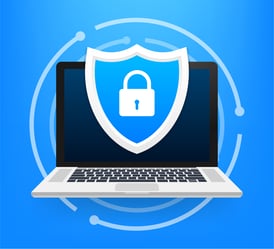 In today's digital age, cybersecurity is a top concern for businesses and organizations worldwide. The importance of safeguarding sensitive data and systems cannot be overstated, and at Markon, we take this responsibility seriously. As a company specializing in federal government services, the security of our operations is paramount. However, it's important to remember that cybersecurity is a shared responsibility, and everyone plays a crucial role in maintaining a secure work environment.
In today's digital age, cybersecurity is a top concern for businesses and organizations worldwide. The importance of safeguarding sensitive data and systems cannot be overstated, and at Markon, we take this responsibility seriously. As a company specializing in federal government services, the security of our operations is paramount. However, it's important to remember that cybersecurity is a shared responsibility, and everyone plays a crucial role in maintaining a secure work environment.
Below are five essential cybersecurity tips that everyone should be aware of and follow diligently.
1. Strong Passwords and Authentication
The first line of defense against cyber threats starts with your passwords and authentication practices. Here are some key considerations:
- Unique Passwords: Use strong, unique passwords for all your accounts, whether at work or in your personal life. Avoid using easily guessable information like birthdays or common words.
- Password Manager: Consider using a reputable password manager to generate and store complex passwords securely. These tools can help you keep track of multiple strong passwords without the need to remember them all. However, it is crucial to do your homework and ensure that the password manager you choose lives up to its security claims — *ahem* LastPass.
- Multi-Factor Authentication (MFA): Whenever possible, enable multi-factor authentication (MFA) for your accounts. MFA adds an extra layer of security by requiring you to provide two or more forms of verification, such as a password and a fingerprint or a one-time code. This significantly enhances your account's security. If you work in secure sites, as many Markon teammates and clients do, you can utilize a secure token, rather than a cell phone, to receive your one-time codes for MFA.
2. Email and Text Safety
Email is a common vector for cyberattacks, so it's essential to be cautious with your email practices:
- Attachments and Links: Be wary of opening attachments or clicking on links, especially if they're unexpected and/or from unknown sources. Cybercriminals often use these tactics to deliver malware or phishing attacks.
- Verification: Verify the authenticity of emails or text messages requesting information or payments. Phishing emails are a common tactic used to trick employees into revealing sensitive information.
- Report Suspicious Emails and Texts: If you receive a suspicious email or text message, report it immediately to your IT department or security team. Prompt reporting can help prevent potential security breaches.
3. Device and Software Updates
Keeping your devices and software up-to-date is crucial for maintaining a secure environment:
- Security Patches: Regularly update your devices, including computers, smartphones, and tablets, with the latest security patches and updates.
- Automatic Updates: Whenever possible, enable automatic updates. This ensures that you're always protected without relying on manual updates.
- Antivirus and Anti-Malware: Use trusted and up-to-date antivirus and anti-malware software to scan and protect your devices from threats.
4. Data Handling and Privacy
Protecting sensitive data is paramount, especially when working with government contracts:
- Secure Networks: Only access and share company data on secure, authorized networks and platforms.
- No Personal Accounts: Avoid using personal email accounts or cloud storage for work-related documents.
- Compliance: Follow data handling policies and procedures established by your organization and client organizations. These guidelines are in place to protect both you and the company.
- Secure Disposal: Dispose of sensitive documents and data securely, whether in digital or physical form. Shredding physical documents and securely deleting digital files are essential practices.
5. Awareness and Training
Staying informed and educated about cybersecurity threats is vital:
- Stay Informed: Stay up-to-date on current cybersecurity threats and trends. Knowledge is your first line of defense.
- Training Programs: Participate in cybersecurity briefings, training, and awareness programs. These programs are designed to equip you with the knowledge and skills needed to identify and respond to potential threats.
- Vigilance: Be vigilant and report any suspicious activities or security concerns to your IT department immediately. Early detection can prevent more significant security incidents.
By adhering to these valuable cybersecurity tips and maintaining a constant state of vigilance, you not only safeguard your digital presence but also make a significant contribution to fortifying the overall security of your organization. Together, we can effectively neutralize potential cyber threats and ensure a safer digital landscape for all.

